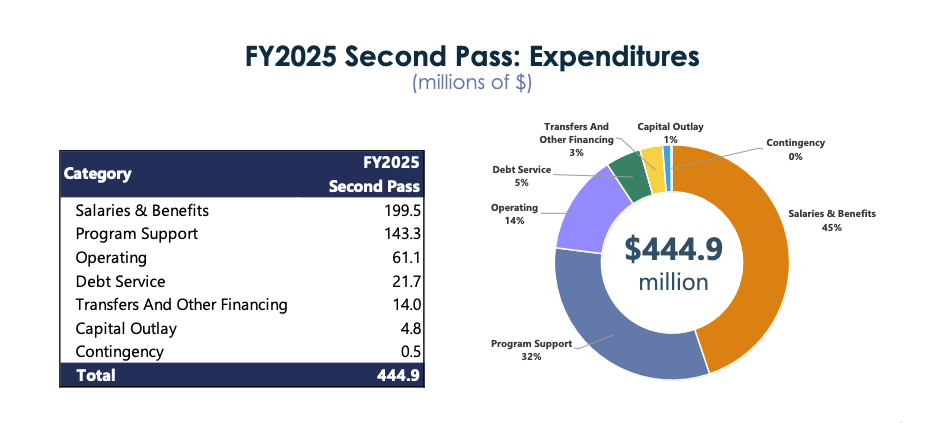At its April 23 work session, the Buncombe County Board of Commissioners took a second look at the county’s 2024-25 budget. During the meeting, staff presentations showed a $28.5 million gap between next year’s revenues and expected expenditures.
County spending is projected to grow by more than $8 million next year, to $444.9 million, said county Budget Director John Hudson. A large part of that increase comes from a plan to add 22 positions, including nine additional caseworkers and assistants in the Department of Social Services.
Salaries and benefits for more than 1,700 employees account for the largest piece of the county’s expenses, at 45%.
The county also expects to see a 9% increase in debt service over last year, and an 8% increase in its public safety budget, mainly due to higher pay approved last year, Hudson said.
The county plans to save money by leasing rather than buying new vehicles for its fleet next fiscal year, he added.
At this stage, budget staff assumes that education spending will remain flat. However, that may change after a work session Thursday, May 9, that will focus on the county’s two school districts and its volunteer fire districts. Education is the county’s largest spending category, accounting for about 28% of the general fund last year.
The revenue-side projections were bumped up by $4.2 million since the “first pass” budget March 26 to $416.5 million. Those increases are expected to mostly come from property tax revenue, which makes up 64% of the county’s general fund revenue, Hudson said.
Property tax revenues are now projected to increase by 5% over last fiscal year.
If projections hold, the county would have to cover the difference between expenses and revenues with reserves, decreasing the available fund balance to 10.8% of expenditures, Hudson said. The county’s policy is to maintain a fund balance of 15% of annual expenditures. It’s currently about 18%.
To satisfy the fund balance policy, county staff recommends cutting expenses, raising revenue or a combination thereof by $12.3 million, Hudson said.
After the Thursday, May 9, work session, County Manager Avril Pinder will present the staff’s recommended budget to commissioners at the regular meeting Tuesday, May 21. There will be a public hearing Tuesday, June 4, and the budget is scheduled for a final vote on Tuesday, June 18.




The US economy is in stagflation which will worsen unless the US Congress authorizes more deficit spending. With the challenge to the US dollar from abroad, Congress is going to be constrained in doing such; therefore, it seems likely the stagflation will worsen over time.
Local leaders need to be doing a deep dive into their budgets and start reducing expenditures.
Gee Mike, the average American household owes $259,000- for their share of the national debit. This doesn’t include personal debit ( mortgage, car, school, credit card etc.) and you want more borrowing? This increases inflation. One of the most concerning things going on in the economy is federal borrowing that has greatly increased the inflation rate. Then there’s the fact the money has to be paid back since deficient spending means spending money you don’t have. We are near a financial death spiral because of deficient spending and high interest rates.
This reminds me of one spouse telling the other we’re bankrupt but if we get more credits cards we will no longer be bankrupt.
No more discretionary spending on
Student loans
Immigration
Non profits
River arts
Social engineering
Let’s worry about required not “I want spending”
Anyone that believes the county commission neo-Marxists will reduce spending instead of just raising taxes hasn’t looked at their property tax appraisal, mine went up 150%.
Every time the county government employees get a raise, it is a pay cut for the taxpayers stuck funding these parasites, while Bidenomics stagflation destroys our ability to stay ahead of expenses.